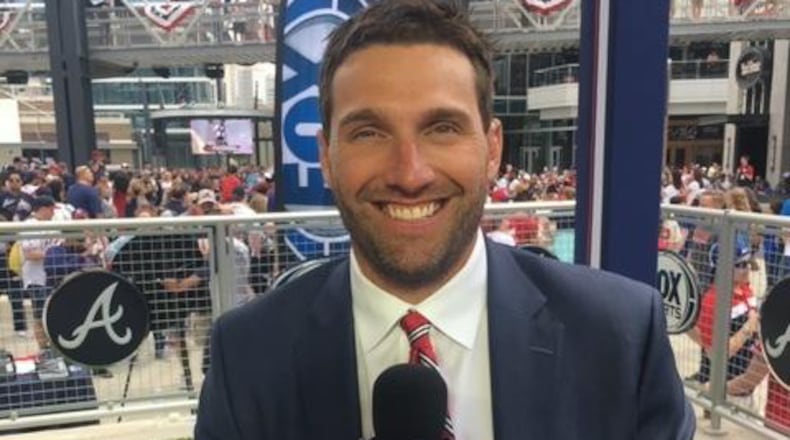Today’s interviewee is Braves and TBS broadcaster Jeff Francoeur. Francoeur is a partner and podcast co-host for Pure Athlete, whose mission is to encourage and guide young athletes and their families in their youth sports journeys. A generation ago, Francoeur was a celebrated two-sport athlete at Parkview, leading his high school teams to two state titles each in baseball (2001, 2002) and football (2000, 2001). Though better known as a baseball player and ultimately a major leaguer, Francoeur was the AJC’s all-classification football player of the year in 2001. He was among the first inductees into the Georgia High School Football Hall of Fame in 2022. Francoeur has children ages 10, 8, 5 and 3. He has coached and watched his two oldest in youth sports and will start his 5-year-old in T-ball next spring.
1. The football playoffs are in the second round tonight. You played in quite a few of these playoff games yourself. What was the most memorable game or moment of your high school football career and why? “I love high school football. I’ve talked about this on the podcasts. I love the life lessons, the preparation all week, the discipline it takes, the buildup to Friday night. I was lucky in my junior year to be part of teams that went back-to-back 15-0 and 15-0. Two games stick out, the last two football games that I ever played. We played Valdosta in the Georgia Dome, and we drummed them. We were physical. We just got after it. The Dome was slammed. Nearly the whole bottom part was filled. The history of Valdosta and south Georgia football made that a cool matchup. Then my last game, we played Northside-Warner Robins for the championship. They were 14-0 and had Chansi Stuckey. They were so talented. We go down there and come out on top 12-7. To give up only seven to them was one of the best defensive performances I’ve ever seen. Playing that last game down there at Northside is something I’ll truly never forget.” [Stuckey and Francoeur were in the same football signing class at Clemson. Stuckey played wide receiver there and in the NFL. Francoeur, recruited as a tight end, opted for baseball after the Braves drafted him in the first round.]
2. What was it like to be an athlete at Parkview in those days, and how did you manage two sports? “The great thing about Parkview was that they gave guys and girls the opportunity to play multiple sports. Coach Flowe [football coach Cecil Flowe] and Coach Buchanan [baseball coach Hugh Buchanan] did as good a job as you could do with that. We had 12 or 13 people who played both football and baseball. We had it mapped out during the summer. We had two weeks off for family vacation, July 4-15. The rest of May and all of June on weekends we were somewhere doing a baseball tournament, Savannah, Augusta, wherever. I always missed Friday football practice. Our coaches always knew where we were and what to expect. They knew our schedules. I appreciate how they worked together and manipulated that. These days, I hear a lot of kids say, ‘My coach won’t let me miss.’ We should never be telling high school kids they can’t play another sport. Coach Flowe and Coach Buchanan did a better job than anybody else with that, and that’s why we were so good. They looked out for the person, for me, for my teammates. That’s why we played so hard for them. When you have coaches like that, you’re willing to run through a brick wall for those guys.”
3. What led you to become part of Pure Athlete, and what are the goals? “Britt Lee and Brad Williams had the idea and started it [in October 2022]. I did some speaking engagements with Brad’s company, and he heard me talking about kids in youth sports. I get lots of people calling me with ideas about this and that, but I was having dinner at home with my wife, and she’s telling me that I see a need for good parents and good coaches and that I need an outlet for that. So what we’re trying to do is help kids and parents have the best youth sports experience. What’s the best way to help them out? Having balance is important. With my mom and dad, there was a mandatory two nights a week at home as a family having dinner, and we weren’t going to fudge the rules on that. When you’re 8 years old, you don’t have to play 100 games or drive four states over to play a baseball game. Only 4% play at the next level, and that’s including Division II and III. Chances are a couple of mine won’t play in college. But I want them to realize their dreams whether that’s to play in college or professionally or play in high school. There’s a way to do this that’s fun and competitive.”
4. What is one thing you’d want to tell young athletes and their coaches and families? “I’d love to tell them that before middle school, the development of the kid is way more important than wins and losses. David Pollack said it best on our podcast. Until a kid goes through puberty, you don’t know what they heck you’re working with. I don’t know how many good third- and fourth-grade football players that I played with who by high school didn’t start any more. I don’t know if it’s because they didn’t work as hard or others hit a growth spurt and became studs. So keep developing. Continue to play and get reps. You don’t know where you were headed if you quit. On my softball team, I move my girls around. Don’t just play them in one position. They’re 10 years old. Chances are when they’re in middle school or high school they’ll be playing something else. I’ve got a great shortstop, but I keep telling her she’s going to be a stud center fielder in high school. On my son’s flag football team, we move them around everywhere. They’re going to run the ball and throw the ball. You can’t have people playing one position, especially at a young age. Some might hit a growth spurt at age 12 or 13 and put on six inches and now they’re pushing people around. I’m as competitive as anybody, and I expect you to try to win and give it everything you’ve got, but developing the kid and athlete comes first.”
Produced by Georgia High School Football Daily, a free e-mail newsletter. To join the mailing list, click here.
About the Author
The Latest
Featured


